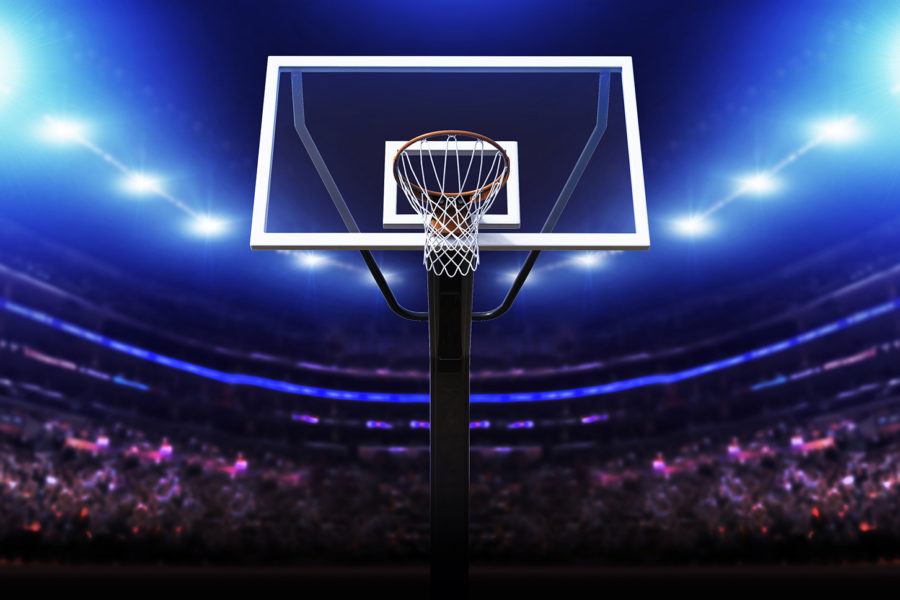
Behind the scenes as Philly prepares for March Madness
The last time Scott Ward helped out at an NCAA men’s basketball tournament event in Philadelphia, his job was not exactly a resume booster.
“I was mixing Powerade in the locker rooms,” he says, laughing. “I’ve come a long way.”
Ward has certainly made progress. He’s the Senior Associate Athletic Director and COO at the University of Pennsylvania. He is also the point man for Penn’s hosting of the East Regional weekend, March 25-27 at Wells Fargo Center (WFC), which will choose a Final Four participant and continue the city’s long tradition of hosting NCAA tourney games.
Since the tourney’s debut, in 1939, Philadelphia has hosted NCAA contests 29 times. Penn’s Palestra, The Spectrum and WFC have all taken turns, with Penn’s venerable gym staging three games in ’39 and then serving as the site on 18 other occasions. The Spectrum checks in with five different tourney opportunities. Included are the 1976 and 1981 Final Fours and the famous Duke-Kentucky regional final in 1992 that the Blue Devils won on Christian Laettner’s dramatic, buzzer-beating turnaround jumper in what some consider the greatest college game of all time. This year will be Wells Fargo’s sixth time and its third regional.
It makes sense that the NCAA should keep coming back to Philly, given the city’s great basketball heritage. Larry Needle, Executive Director of PHL Sports, a division of the Philadelphia Convention and Visitors Bureau, understands that.
“Philadelphia is certainly always in the mix when it comes to NCAA championships, and basketball in particular,” Needle says. “It has a tremendous history.”
•••
When the ball is tossed in the air to start the March 25th Sweet 16 doubleheader, fans fortunate to get a ticket will be treated to great games and memorable performances. Everyone watching on TV will see the Philadelphia sports world at its finest. But getting to that moment will have required tremendous effort, planning and cooperation. The city, Wells Fargo Center and Penn have been working toward the Regional for several years, ever since the NCAA sent out a Request for Proposal.
Philadelphia’s hosting of the tournament is part of a panoply of NCAA events coming to town over the next five years. The city will host first and second-round tourney games in 2026, the men’s lacrosse final four at Lincoln Financial Field in 2023 and ’24, the NCAA rowing championships on the Cooper River in Camden in 2023 and the wrestling championship tournament at WFC in ’25.
“We like to think we have a well-oiled machine in Philadelphia, based on the experience we’ve had hosting so many national and international events over the years,” Needle says. “It speaks to the willing and able partners we have to step up and host events. Our job, at the end of the day, is to be a facilitator. If we don’t have venues and schools and teams stepping up, we don’t have any events.”
•••
As those trying to organize an NCAA event get ready, they have plenty of work to do. Ward says there is one more thing everybody had better do: study.
“The NCAA has a 200-plus page operations manual that you have to know by heart,” he says. “They will quiz you on that.”
Phil Laws can testify to the NCAA’s rigor. As Senior Vice President and Arena General Manager for Wells Fargo Center, he takes part in the walk-through with NCAA reps a couple of days before the games. “It has to be perfect,” Law says. That means the time leading up to that inspection can get hectic, especially since the WFC staff has plenty of events before and after the tournament to deal with.
“It can have its moments,” Laws says. “The days getting ready for [the tournament] can be stressful. The walk-through is more about tweaking.”
Although Philadelphia and Penn are the hosts, this is an NCAA event, and there is an incredible amount of details. For instance, no one in the arena proper may drink out of a cup, glass or bottle that doesn’t have an NCAA logo on it. And the association expects the site to have someone policing that edict.
There is plenty of other work to be accomplished, too. From the city’s point of view, there must be enough hotels, restaurants and other facilities to accommodate the four teams that will be playing, the media who come to town and the NCAA officials on site. The city’s Convention Services team works with local properties to see which ones are interested, and then the NCAA will select six: one for each team, one for the media and one for the game officials. There is also ground transportation and police escorts for the participating schools to arrange. Needle and his team will also coordinate any signage or banners around the city that bring awareness to the event. A key player for Philadelphia in this process is Brea Stanko, the liaison with the NCAA and Wells Fargo Center.
“She will coordinate everything from on-sale ticketing efforts to city awareness, so that people will feel the event while it’s here,” Needle says.
The NCAA doesn’t work directly with the arenas where its tournament games are played—other than to make sure the branding and how things will look (there is a special court) are correct—so it needs a member institution to be its representative. Enter Penn, which takes its turn in the rotation of city schools as a host. Its job is to make sure everything moves smoothly for the schools, so Ward and his team have to work with the city and WFC to make sure the NCAA gets what it needs.
“What the NCAA cares about is the experience for student-athletes, coaches and fans,” Ward says.
In addition to his regular chores at Penn—Ward is also Executive of the Penn Relays—Ward has been working with his staff to put together what is necessary for the weekend. For instance, veteran Penn Sports Information Director Mike Mahoney will be handling media relations for the games, and he has been recruiting volunteers from other schools and city teams to handle all that is necessary for the small army of print, online, TV, radio and other reporters who will cover the tournament in Philadelphia.
Ward must also choose four-team liaisons who will attach themselves to each team and provide whatever is needed during their time in the city. “It’s most likely a Penn person or a Philadelphia basketball person,” Ward says. “It’s a glamor position.” These representatives must be able to handle everything necessary, including arranging team meals and practices. If a team wants to get its picture taken on the steps of the Art Museum, the liaison handles that.
“Whatever a team might need during its stay, it will reach out to that person,” Ward says.
Ward and his staff will make sure locker rooms are equipped properly and that athletic trainers—from Penn and other local schools—are on site. They will make sure the teams get into the venue safely and find their way around.
“We take care of everything behind the scenes,” Ward says.
•••
Laws admits that no one in Philadelphia takes the bid process for NCAA events for granted. And since Laws has spent more than 10 years in the city—and 21 total with Comcast Spectacor, Wells Fargo Center’s owner—he knows what he’s doing. For instance, he has seen the NCAA change its approach to alcohol sales at games over the years. For decades, no one was allowed to have a drop. Then, beer, wine and spirits were allowed in boxes and club areas. Now, the general public will be able to enjoy a drink while watching the games.
He also understands that almost all of the sponsors who have presences as the arena will be supplanted by NCAA partners. That’s not ideal, but Laws says there is an understanding that regional relationships do not take precedence over the NCAA’s deals.
“We have a lot of valuable corporate clients,” Laws says. “They are key foundations of revenue for us. They become invisible. They know that, but it’s strange to have the personality of the building erased.
“At times, it doesn’t seem like our building.”
Despite that change of identity, the NCAA’s presence is a good thing for Wells Fargo Center—“We do get revenue,” Laws says—and Philadelphia. It’s a big event that gets plenty of attention nationwide. It shows that the city remains a preferred destination for the NCAA, as well as professional leagues looking for places to stage big events.
That’s all thanks to those behind the scenes, who make sure everything goes smoothly.
And that the Powerade tastes good.

